The Mitford Bedside Companion Read online
Page 2
God had plans for me.
They were plans for good.
And, I had a future and a hope.
If taken seriously, as I took this Scripture passage then, and take it today, this is thrilling news.
I soldiered on.
Though I was freelancing with national ad agencies, the country had entered into a deep recession, and sometimes I earned no money at all. I wondered whether I might lose my little house, which had cost scarcely more than a car I recently saw in a showroom. Yet, worse than the fear of losing my house was the fear of losing face. I had come to the mountains to write books, and I had failed.
Then, lying in bed one night, I had an odd and surprising mental image.
It was of a man walking down a village street. That, and nothing more.
I examined this figment of my restless imagination.
The man, I could see by his collar, was a priest. He was short of stature, balding, and a dash overweight. He had a positive, upbeat stride. How did he live his life? What were his thoughts and aspirations? Who was this obviously ordinary man and what did he mean to me, if anything?
I got up and sat at my desk for a long time, and then began to write.
“He left the coffee-scented warmth of the Main Street Grill and stood for a moment under the green awning.
“The honest cold of an early mountain spring stung him sharply….”
I wrote on for several days, though absolutely nothing of any consequence was happening with this character. Then, days turned into weeks, and soon, I had a chapter or two. But a chapter or two of what?
I took it to the editor of the Blowing Rocket, Jerry Burns, who is as close to literati as we have in the little town of Blowing Rock. I remember how uncomfortable I was, asking someone to read a work that even I couldn’t define or categorize.
“What do you think I have here?” I asked, afraid of the answer.
“I don’t know,” he said.
“Ah.”
“But I like it. Why don’t we run it in the paper?”
Clearly, small-town newspaper editors are desperate men.
Once a week, my story occupied a half-page of the little newspaper that, at the time, sold for ten cents a copy. Without meaning to at all, I became a bona fide columnist with a weekly deadline and the sole compensation of a newspaper, hot off the press, every Thursday.
As I wrote the installments, I continued to keep a journal. Unfortunately, someone posing as a computer expert lost it, along with an entire fiction file, but that’s another story.
Often, I wanted to give up writing what I called “The Mitford Years.” But I couldn’t give up. I had an agreement to help fill space in our local newspaper! Better still, I was eager to know what was happening in the life of a character who was the bookish, unmarried, sixtysomething Episcopal priest Father Tim.
In truth, a lot was happening. A dog the size of a sofa, a thrown-away boy, and a good-looking neighbor moved into this earnest man’s quiet life, and suddenly, as they say in the film business, “the story had legs.” (So did his neighbor, by the way.)
When I finished writing this story, I was amazed to find I had written far more than two years’ worth of “columns.” I had, in fact, written a book.
Two more years, great anguish, and considerable privation passed before At Home in Mitford was sold. And you know the rest.
I tell you all that in order to assure you of this:
God has plans for you.
His plans are for good.
And, if you trust Him, you have both a future and a hope.
How do I know this to be utterly and absolutely true?
Because I have lived it.
And I am living it still.
To God be the glory, great things He hath done. And will continue to do, if only we trust Him.
* * *
“For I know the plans I have for you,” says the Lord. “They are plans for good and not for disaster, to give you a future and a hope. In those days when you pray, I will listen. If you look for me in earnest, you will find me when you seek me.”
—Jeremiah 29:11-13, New Living Translation,
Tyndale House Publishers
* * *
A Little World of Our Own: The Town of Mitford
Long after the fictitious small town of Mitford was conceived, and a couple of the novels were written, I came upon a lovely little book called Our Village.
Written by Mary Russell Mitford, an Englishwoman, and published in 1839 by Cassell and Company, Ltd., it was a tender tribute to the English village and its people. Indeed, it was an attempt to preserve something precious; to so document a way of life that it might remain forever our own.
In the opening pages, Miss Russell pens much of my thinking when I created Mitford, North Carolina.
Of all situations for a constant residence, that which appears to me most delightful is a little village…with inhabitants whose faces are as familiar to us as the flowers in our garden; a little world of our own, close-packed and insulated like ants in an ant-hill, or bees in a hive, or sheep in a fold, or nuns in a convent, or sailors in a ship; where we know every one, are known to every one, interested in every one and authorized to hope that every one feels an interest in us.
How pleasant it is to slide into these true-hearted feelings from the kindly and unconscious influence of habit and to learn to know and to love the people about us, with all their peculiarities, just as we learn to know and to love the nooks and turns of the shady lanes and sunny commons that we pass every day.
…nothing is so delightful as to sit down in a country village in one of Miss Austen’s delicious novels, quite sure before we leave it to become intimate with every spot and every person it contains.
Over the years, you’ve become intimate with nearly every spot and person contained in Mitford. In your lively imagination, the faces of Uncle Billy and Miss Rose, George Gaynor, Hope Winchester, Miss Sadie and Louella, Mule Skinner, Dooley, Lace, Esther Bolick are all as familiar to you as the flowers in your garden.
In truth, Mitford has done what I hoped it might do. According to your many letters, it has become a little world, and an extended family, all your own.
As I go on to write of other worlds, my fondest wish is that Mitford won’t be allowed to collect dust on your shelves. Just as we visit loved ones again and again, so you may go again and again to Mitford.
Sometimes for refreshment. Often for peace. And always for hope.
THE PAUSE THAT REFRESHES
THE VILLAGE OF MITFORD was set snugly into what would be called, in the west, a hanging valley. That is, the mountains rose steeply on either side, and then sloped into a hollow between the ridges, rather like a cake that falls in the middle from too much opening of the oven door.
According to a walking parishioner of Lord’s Chapel, Mitford’s business district was precisely 342 paces from one end to the other.
At the north end, Main Street climbed a slight incline, and circled a town green that was bordered by a hedge of hemlocks and anchored in the center by a World War II memorial. The green also contained four benches facing the memorial and, in the spring, a showy bed of pansies, which one faction claimed was the official town flower.*
Directly to the left of the green was the town hall, and next to that, the First Baptist Church. Set into the center of its own display of shrubs and flowers on the front bank was a wayside pulpit permanently bearing the Scripture verse John 3:16, which the members long ago had agreed was the pivotal message of their faith.
To the right of the green, facing Lilac Road, was the once-imposing home of Miss Rose and Uncle Billy Watson, whose overgrown yard currently contained two chrome dinette chairs that they used while watching traffic circle the monument.
Visitors who walked the two-block stretch of the main business district were always surprised to find the shops spaced so far apart, owing to garden plots that flourished between the buildings. In the loamy, neatly edged beds were wooden
signs:
Garden Courtesy of Joe’s Barber Shop, Upstairs to Right
Take Time to Smell the Roses, Courtesy Oxford Antiques
A Reader’s Garden, Courtesy Happy Endings Bookstore
“Mitford,” observed a travel feature by a prominent newspaper, “is a village delightfully out of step with contemporary America. Here, where streets are named for flowers, and villagers can seek the shade of a dozen fragrant rose arbors, spring finds most of the citizenry, including merchants, making gardens.
“…and while Mitford’s turn-of-the-century charm and beauty attract visitors like bees to honeysuckle, the town makes a conscious effort to discourage serious tourism.
“‘We want people to come and visit,’ says Mayor Esther Cunningham, ‘but we’re not real interested in having them stick around. The college town of Wesley, just fifteen miles away, is perfect for that. They’ve got the inns and guesthouses and all. Mitford would simply like to be the pause that refreshes.’”
Going south on Main Street to Wisteria Lane were the post office, the library, a bank, the bookstore, Winnie Ivey’s Sweet Stuff Bakery, and a new shop for men’s furnishings.
There was also a grocery store, so well-known for its fresh poultry and produce from local sources that most people simply called it The Local. For thirty-six years, The Local had provided chickens, rabbits, sausage, hams, butter, cakes, pies, free-range eggs, jams, and jellies from a farming community in the valley, along with vegetables and berries in season. In summer, produce bins on the sidewalk under the green awnings were filled each day with Silver Queen corn in the shuck. And in July, pails of fat blackberries were displayed in the cooler case.
To the left of Main Street, Wisteria Lane meandered past the Episcopal rectory, whose back door looked upon the green seclusion of Baxter Park, and then climbed the hill to the Presbyterians.
To the right of Main, Wisteria led only to Wesley Chapel, a tiny Methodist church that stood along the creek bank in a grove of pink laurel and was known for the sweetness of its pealing bells.
The second and only other business block of Main Street was lined with a hardware store, a tea shop, a florist, an Irish woolen shop, and an antique shop, with gardens in between.
Next, Main was crossed by Old Church Lane, rising steeply on the left to Church Hill Drive, where the ruined foundation of Mitford’s first Episcopal church stood in the tall grass of the upland meadows near Miss Sadie Baxter’s Fernbank.
At the opposite end of the lane was Lord’s Chapel, which stood between two vacant lots. After passing the church, which was noted for its fine Norman tower and showy gardens, the lane narrowed to a few comfortable houses on the bank of a rushing stream, where Indian pipes were said to grow in profusion.
As the streets and lanes gave way to countryside and sloped toward the deeper valley, the rolling farmland began. Here, pastures were stocked with Herefords and Guernseys; lakes were filled with trout and brim; barnyards succored chattering guineas. And everywhere, in town or out, was the rich, black loam that made the earthworm’s toil one of unending satisfaction.
At Home in Mitford, Ch. 1
THE TOWN MERCHANTS
It occurs to me that a town isn’t a town without its merchants. Indeed they, as much as anyone or anything, give a community its unique persona.
If you’re new to the series, here’s a small handful of Main Street businesses that will help you feel more at home in Mitford.
The Local
AVIS PACKARD, PROPRIETOR
IN THE LITTLE village of less than a thousand, everyone’s dinner—party or otherwise—began at The Local, unless they wanted to make the fifteen-mile drive to Food Value. Of course, they could go out on the highway to Cloer’s Market, but Hattie Cloer was so well-known for telling customers her aches and pains that hardly anyone ever did that.
Avis Packard once said that Hattie Cloer had sent more business to The Local than any advertising he’d ever run in the paper.
One thing Father Tim liked about Avis Packard was the way he got excited about his groceries. He could rhapsodize about the first fresh strawberries from the valley in a way that made him a veritable Wordsworth of garden fare. “We got a special today on tenderloin that’s so true to the meanin’ of th’ name, you can cut it with a fork.”
At Home in Mitford, Ch. 4
Main Street Grill
PERCY AND VELMA MOSELY, PROPRIETORS
AS MULE SKINNER puts it, “Percy’s daddy opened it fifty-two years ago. It’s a dadgum historic landmark.”
A Light in the Window, Ch. 12
“DID YOU SEE IT?” asked Percy.
“See what?”
“Th’ banner.”
“Aha! Got it up, did you?”
Percy looked grim. “Went up this mornin’ at ten o’clock. Caused a stir.”
“It’s hard to see a banner when it’s on an awning over your head. I’ll step across the street and take a look.”
“They left a letter out of th’ dadgum thing.”
“You don’t mean it.”
“But they knocked fifty bucks off th’ price.”
“The least they could do.”
“I started to tell ’em to jus’ shove th’ whole business, but…” Percy shrugged, despondent.
“Go ahead and make me a tuna melt. I’ve got some leeway in my diet today. Be right back.”
He jaywalked toward the other side of the street, barely dodging Esther Bolick in her husband’s pickup truck. Esther screeched to a halt and leaned out the window. “I hear th’ mayor leaked the news to Miss Sadie.”
“We’re forging ahead.”
“I’m not doing orange marmalade,” said Esther. “I’m doing peanut butter. Three layers, with jelly in between. Apple or grape?”
“Grape!”
“For gosh sake, get out of the street before somebody nails you,” she said, roaring off.
Safely on the other side, he turned and peered at the banner over Percy’s awning.
Eat Here Once, And You’ll Be Regular
He guffawed, slapping his leg.
But whoa. He couldn’t stand here laughing. What if Percy looked out the window and saw him?
He turned his back to the Grill as if he were examining the brick-work in the post office, and hooted. The postmaster stuck his head out the door and pointed to the banner, grinning. “I’ve also known it to be otherwise,” he reported.
He trotted across the street. “Percy,” he said, soberly, “I’d give the banner company their fifty dollars back.”
“What do you mean?”
“I mean that banner is going to be the talk of the town.”
Percy brightened. “You think so?”
“That’s what advertising is all about, isn’t it?”
“Well…” said Percy.
“Trust me on this,” said the rector.
These High, Green Hills, Ch. 13
“I GOT TO do somethin’ to rake in business.”
Percy slid into the booth, looking…. Father Tim pondered what Percy was looking…. Percy was looking old, that’s what; about like the rest of the crowd in the rear booth. He sucked up his double chin.
“Maybe I ought t’ mess around with th’ menu,” said Percy, “an’ come up with a special I could run th’ same day ever’ week.”
“Gizzards!” said Mule.
“What about gizzards?”
“I’ve told you for years that gizzards is th’ answer to linin’ your pockets.”
“Don’t talk to me about gizzards, dadgummit! They’re in th’ same category as what goes over th’ fence last. You’ll never see me sellin’ gizzards.”
“To make it in th’ restaurant business,” said Mule, “you got to set your personal preferences aside. Gizzards are a big draw.”
“He’s right,” said J.C. “You can sell gizzards in this town. This is a gizzard kind of town.”
* * *
“Oddly, it is not real cooks who insist that the finest ingredien
ts are necessary to produce a delicious something…. Real cooks take stale bread and aging onions and make you happy.”—Susan Wiegand, Cooking as Courtship
“Cooking is like love. It should be entered into with abandon or not at all.”
—Harriet Van Horne
* * *
Mule swigged his coffee. “All you got to do is put out a sign and see what happens.”
Percy looked skeptical. “What kind of sign?”
“Just a plain, ordinary sign. Write it up yourself an’ put it in th’ window, no big deal.”
“When me an’ Velma retire at th’ end of th’ year, I want to go out in th’ black, maybe send ’er to Washington to see th’ cherry blossoms, she’s never seen th’ cherry blossoms.”
“That’s what gizzards are about,” said Mule.
“What d’you mean?”
“Gizzards’ll get some cash flow in this place.”
“Seem like chicken livers would draw a better crowd,” said Percy.
“Livers tie up too much capital.” J.C. was hammering down on country ham, eggs over easy, and a side of yogurt. “Too much cost involved with livers. You want to go where the investment’s low and the profit’s high.”
Mule looked at J.C. with some admiration. “You been readin’ th’ Wall Street Journal again.”
“What would I put on th’ sign?” asked Percy.
“Here’s what I’d put,” said Mule. “Gizzards Today.”
“That’s it? Gizzards Today?”
“That says it all right there. Like you say, run your gizzard special once a week, maybe on…” Mule drummed his fingers on the table, thinking. “Let’s see…”
“Tuesday!” said J.C. “Tuesday would be good for gizzards. You wouldn’t want to start out on Monday with gizzards, that’d be too early in th’ week. And Wednesday you’d want something…”
“More upbeat,” said Mule.

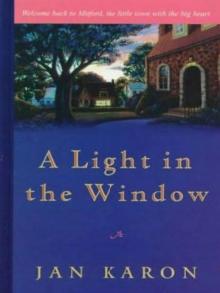 A Light in the Window
A Light in the Window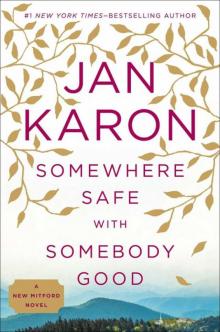 Somewhere Safe With Somebody Good
Somewhere Safe With Somebody Good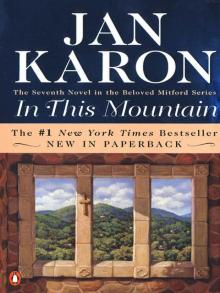 In This Mountain
In This Mountain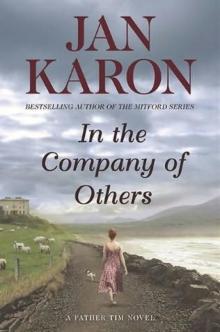 In the Company of Others
In the Company of Others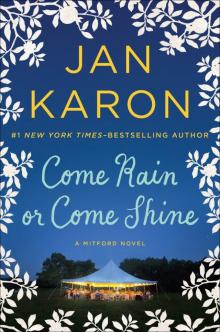 Come Rain or Come Shine
Come Rain or Come Shine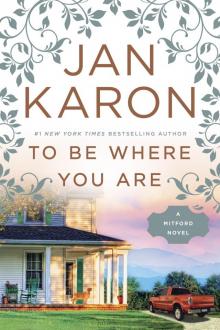 To Be Where You Are
To Be Where You Are These High, Green Hills
These High, Green Hills Light From Heaven
Light From Heaven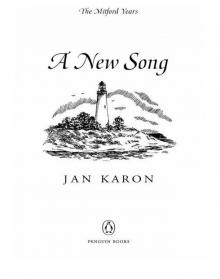 A New Song
A New Song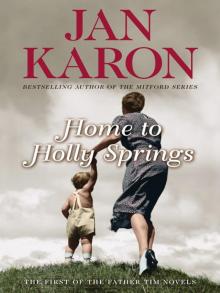 Home to Holly Springs
Home to Holly Springs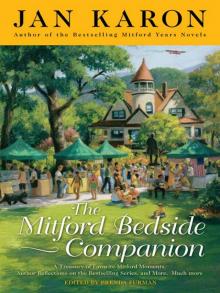 The Mitford Bedside Companion
The Mitford Bedside Companion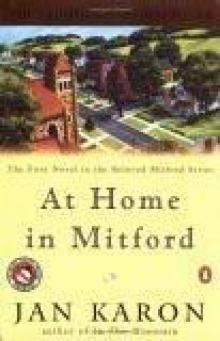 At Home in Mitford
At Home in Mitford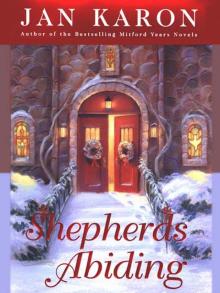 Shepherds Abiding
Shepherds Abiding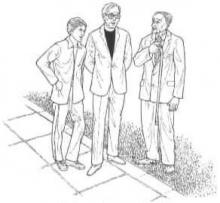 Out to Canaan
Out to Canaan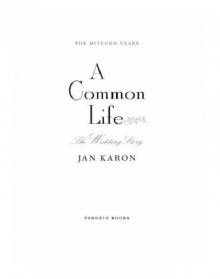 A Common Life: The Wedding Story
A Common Life: The Wedding Story Jan Karon's Mitford Years
Jan Karon's Mitford Years